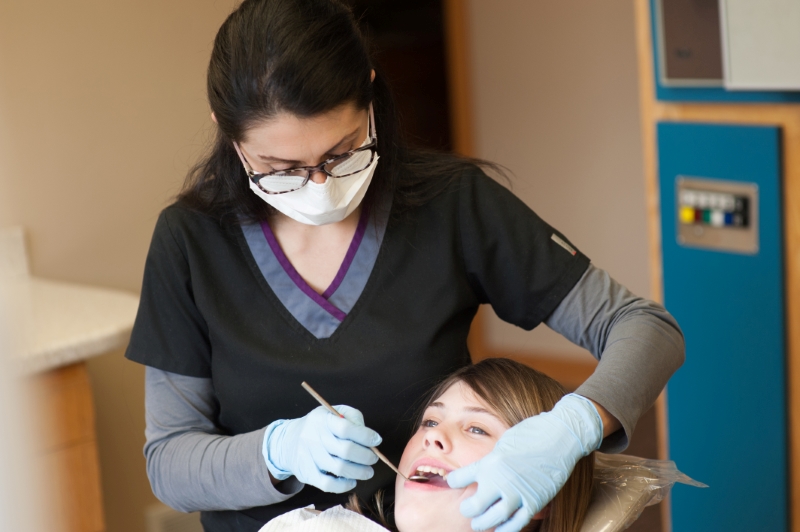Along with the American Academy of Pediatric Dentistry, we recommend that a child's first dental visit be scheduled by his/her 1st birthday. It is very important to make the first visit as positive and enjoyable for the child as possible. We want your child to enjoy getting to know our team and be comfortable at all times! A pleasant, comfortable first visit builds trust and helps put the child at ease during future dental visits. Let your child know that the dentist and staff will explain everything in detail and will answer any questions he/she has. Children should be encouraged to discuss any fears or anxiety they feel.
Parents, please refrain from using any words that could cause unnecessary fear, such as "needle" or "drill." We are experienced in dealing with children with anxiety and can explain treatment procedures in a positive, pleasant manner to avoid any anxious or negative feelings toward dentistry.
We will record your child's dental and medical history, complete a comprehensive examination and discuss any findings with you. We will also review with you and your child the importance of maintaining a good at-home oral hygiene routine to ensure that your child keeps a healthy, beautiful smile for life!
Q. At what age should my child have his/her first dental visit?
A. "First visit by 1st birthday" is the general
rule. To prevent dental problems, your child should see a pediatric
dentist when the first tooth appears – usually between 6 and 12 months
of age – and certainly no later than his/her 1st birthday.
Q. How should I clean my baby's teeth?
A. A toothbrush with soft bristles and a small head,
especially one designed for infants, is the best choice for babies.
Brushing at least once a day, at bedtime, will remove plaque bacteria
that can lead to decay.
Q. What is baby bottle tooth decay, and how can I prevent it?
A. Baby bottle tooth decay is a pattern of rapid
decay associated with prolonged nursing. It happens when a child goes to
sleep while breast-feeding and/or bottle-feeding. During sleep, the
flow of saliva is reduced, and the natural self-cleansing action of the
mouth is diminished. Avoid nursing children to sleep or putting anything
other than water in their bedtime bottle.
Q. How can I help my child through the teething stage?
A. When teeth erupt, sore gums are part of the
normal eruption process. The discomfort is eased for some children by
use of a teething biscuit, a piece of toast or a frozen teething ring
Q. Can thumb sucking be harmful for my child's teeth?
A. Thumb and pacifier sucking habits that go on for a
long period of time can create crowded, crooked teeth or bite problems.
If children are still sucking their thumbs or fingers when their
permanent teeth erupt, a mouth appliance may be recommended by your
pediatric dentist. Most children stop these habits on their own.
Q. If my child gets a toothache, what should I do?
A. To comfort your child, rinse his/her mouth with
warm salt water, and apply a cold compress or ice wrapped in a cloth on
your child's face if it is swollen. Do not put heat or aspirin on the
sore area, but you may give the child acetaminophen for pain. Please see
us as soon as possible.
Q. My child plays sports. How should I protect my child's teeth?
A. A mouth guard should be a top priority on your
child's list of sports equipment. Athletic mouth protectors, or mouth
guards, are made of soft plastic and fit comfortably to the shape of the
upper teeth. They protect a child's teeth, lips, cheeks and gums from
sports-related injuries. Any mouth guard works better than no mouth
guard, but a custom-fitted mouth guard fitted by our dentist is your
child's best protection against sports-related injuries.
Q. If my child gets a cavity in a baby tooth, should it still be filled?
A. Primary, or "baby," teeth are important for many
reasons. Not only do they help children speak clearly and chew
naturally, they also aid in forming a path that permanent teeth can
follow when they are ready to erupt. Some of them are necessary until a
child is 12 years old or older. Pain, infection of the gums and jaws,
impairment of general health and premature loss of teeth are just a few
of the problems that can happen when baby teeth are neglected. Also,
because tooth decay is really an infection and will spread, decay on
baby teeth can cause decay on permanent teeth. Proper care of baby teeth
is instrumental in enhancing the health of your child.
Q. What should I do if my child knocks out a permanent tooth?
A. First of all, remain calm. If possible, find the
tooth and hold it by the crown (top) rather than the root. Replace the
tooth in the socket, and hold it there with clean gauze or a washcloth.
If you can't put the tooth back in the socket, place the tooth in a
clean container with milk. If milk is not available you can store it in saliva or water. Take your child and the glass
immediately to the dentist. Time is essential, so the faster
you act, the better your chances of saving the tooth.